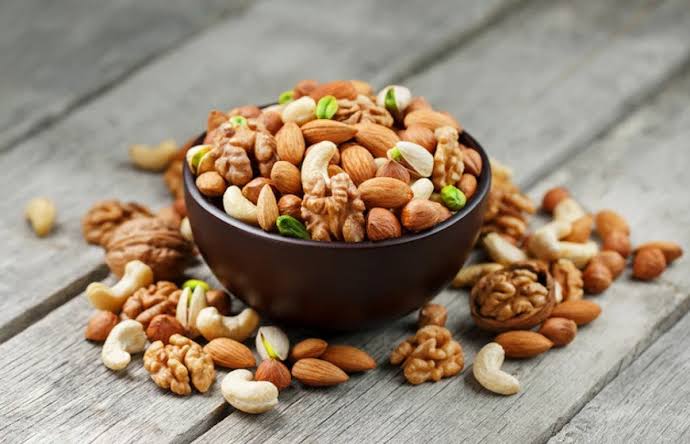जैविक और गैर-जैविक सूखे मेवों के बीच मुख्य अंतर क्या हैं?
जैविक सूखे मेवे बिना सिंथेटिक कीटनाशकों और उर्वरकों के उगाए जाते हैं, जबकि गैर-जैविक मेवे पारंपरिक कृषि पद्धति का उपयोग करके उगाए जाते हैं।
विस्तृत उत्तर:
- कृषि पद्धतियाँ: जैविक सूखे मेवे बिना सिंथेटिक कीटनाशकों, शाकनाशियों और उर्वरकों के उगाए जाते हैं।
- पोषक तत्व: रासायनिक उपचार के अभाव के कारण जैविक सूखे मेवों में अक्सर अधिक पोषक तत्व बरकरार रहते हैं।
- पर्यावरणीय प्रभाव: जैविक खेती आमतौर पर पर्यावरण के लिए अधिक अनुकूल होती है, तथा जैव विविधता और मृदा स्वास्थ्य को बढ़ावा देती है।
-
लागत: जैविक सूखे मेवे आमतौर पर अधिक उत्पादन लागत और श्रम-गहन प्रथाओं के कारण अधिक महंगे होते हैं।

क्या जैविक सूखे मेवे गैर-जैविक सूखे मेवों से अधिक स्वास्थ्यवर्धक होते हैं?
हां, जैविक सूखे मेवों को अक्सर स्वास्थ्यवर्धक माना जाता है क्योंकि उनमें कीटनाशक कम होते हैं और पोषक तत्व अधिक होते हैं।
विस्तृत उत्तर:
- कम कीटनाशक अवशेष: जैविक सूखे मेवों में सिंथेटिक कीटनाशकों का स्तर काफी कम होता है।
- उच्च पोषक स्तर: अध्ययनों से पता चलता है कि जैविक फलों में कुछ पोषक तत्वों और एंटीऑक्सीडेंट का स्तर अधिक हो सकता है।
- कोई जीएमओ नहीं: जैविक खेती में आनुवंशिक रूप से संशोधित जीवों के उपयोग पर प्रतिबंध है।
-
स्वस्थ मृदा: जैविक कृषि पद्धतियां मृदा स्वास्थ्य को बढ़ाती हैं, जिससे उपज की पोषणात्मक गुणवत्ता में सुधार हो सकता है।
क्या जैविक सूखे मेवों का स्वाद गैर-जैविक सूखे मेवों से बेहतर होता है?
कई लोगों का मानना है कि प्राकृतिक परिस्थितियों और रसायनों के अभाव के कारण जैविक सूखे मेवों का स्वाद बेहतर होता है।
विस्तृत उत्तर:
- प्राकृतिक स्वाद: प्राकृतिक परिस्थितियों के कारण जैविक सूखे मेवों का स्वाद अधिक समृद्ध हो सकता है।
- रसायन-मुक्त: सिंथेटिक रसायनों की अनुपस्थिति के परिणामस्वरूप अधिक स्वच्छ, अधिक प्राकृतिक स्वाद प्राप्त हो सकता है।
-
अधिक पके फल: जैविक फलों की कटाई अक्सर तब की जाती है जब वे पूरी तरह से पके होते हैं, जिससे उनका स्वाद बढ़ जाता है।

क्या जैविक सूखे मेवों के लिए अतिरिक्त भुगतान करना उचित है?
कई लोगों के लिए, जैविक सूखे मेवों के स्वास्थ्य और पर्यावरणीय प्रभाव सहित लाभ, उनकी ऊंची कीमत को उचित ठहराते हैं।
विस्तृत उत्तर:
- स्वास्थ्य लाभ: कीटनाशकों के संपर्क में कमी तथा पोषक तत्वों की मात्रा अधिक।
- पर्यावरणीय प्रभाव: पर्यावरण की रक्षा करने वाली टिकाऊ कृषि पद्धतियों का समर्थन करता है।
- पशु कल्याण: जैविक खेती में अक्सर पशुओं के साथ अधिक मानवीय व्यवहार के मानक शामिल होते हैं।
-
सामुदायिक समर्थन: जैविक उत्पाद खरीदने से स्थानीय और छोटे पैमाने के किसानों को समर्थन मिलता है जो टिकाऊ कृषि करते हैं।

मैं कैसे बता सकता हूँ कि सूखे मेवे वास्तव में जैविक हैं?
प्रमाणन लेबल देखें, प्रतिष्ठित ब्रांडों की जांच करें, जैविक दावों के लिए पैकेजिंग की समीक्षा करें, और विशेष जैविक दुकानों से खरीदें।
विस्तृत उत्तर:
- प्रमाणन लेबल: यूएसडीए ऑर्गेनिक, ईयू ऑर्गेनिक या ऑर्गेनिक इंडिया जैसे मान्यता प्राप्त जैविक प्रमाणन निकायों से प्राप्त लेबल देखें।
- प्रतिष्ठित ब्रांड: ऐसे प्रसिद्ध और विश्वसनीय ब्रांडों से खरीदारी करें जो जैविक प्रथाओं के लिए प्रतिबद्ध हों।
- पैकेजिंग जानकारी: जैविक प्रमाणीकरण के स्पष्ट संकेत और विस्तृत सामग्री सूची के लिए पैकेजिंग की जांच करें।
-
जैविक स्टोर: उत्पादों की प्रामाणिकता सुनिश्चित करने के लिए विशेष जैविक स्टोर या सुपरमार्केट के समर्पित अनुभागों से खरीदें।
निष्कर्ष
सही मायने में ऑर्गेनिक ड्राई फ्रूट्स की पहचान करने के लिए सर्टिफिकेशन लेबल देखना, प्रतिष्ठित ब्रांड से खरीदना, पैकेजिंग की जानकारी की समीक्षा करना और विशेष ऑर्गेनिक स्टोर पर खरीदारी करना शामिल है। इन सुझावों का पालन करके, आप यह सुनिश्चित कर सकते हैं कि आपके द्वारा खरीदे गए ड्राई फ्रूट्स वास्तव में ऑर्गेनिक हैं, जो आपको स्वच्छ, टिकाऊ उत्पादों का सेवन करने से मिलने वाले स्वास्थ्य लाभ और मन की शांति प्रदान करते हैं।
आप ऐसे जैविक ड्राई फ्रूट्स हमारी वेबसाइट www.mevabites.com से खरीद सकते हैं।





